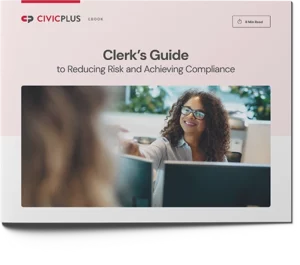10 Common Barriers Clerks Face Achieving Efficiency, Transparency, and Compliance
Clerks have one of the most multifaceted jobs in local government. Not only are they responsible for supporting governance, but they’re also tasked with overseeing record-keeping, driving public transparency, and ensuring compliance with a plethora of evolving laws and regulations.
There’s a lot to balance, and when obstacles present themselves, the role only becomes more complicated.
In this blog article, we’ll outline 10 common barriers that clerks face on a regular basis — and provide strategies for overcoming them.
1. Complex and Ever-Changing Legislation
Clerks must be aware of any changes to federal, state, and local laws to ensure that their offices and communities remain compliant. However, these regulations, particularly the Freedom of Information Act (FOIA) and Government in the Sunshine Act, are often tough to understand and seem to change all the time. Still, the stakes are high. Failure to comply can result in fines, lawsuits, and fractured public trust.
Solution: By implementing automated compliance tools, educating the public, and conducting regular staff training sessions, clerks can help ensure that their offices and communities maintain compliance, avoiding costly penalties of missing legal requirements — financial and otherwise.
2. Limited Access to Technology
Manual record-keeping, filing, and data entry can slow efficiency and lead to errors. By embracing automation, you can save time, scale with ease, and even boost resident engagement by providing online self-service capabilities.
Solution: Investing in software upgrades, cloud storage, and integrated technologies can increase clerk productivity and help local governments save money in the long run.
Related: Learn Why Local Governments Need an Automated Request Solution
3. High Volume of Public Records Requests
Especially during certain times of the year, FOIA requests can spike — and clerks have to be ready. Having a backlog can overwhelm office staff, and delayed or incomplete responses can undermine public transparency efforts.
Solution: Embrace technology with key features to streamline document retrieval, automate tedious redaction tasks, and provide the public with online self-service capabilities to reduce the number of repetitive requests. With purpose-built public records request management software from an established government technology provider, clerks can be confident that redactions get handled properly.
4. Staff Shortages and High Turnover
Many clerks’ offices operate with a small staff of varied professional roles, and turnover can lead to a lack of institutional knowledge. The result? Administrative delays, burnout, and inefficiencies in maintaining compliance.
Solution: Education is power. Cross-training staff in crucial roles builds camaraderie, fuels teamwork, and allows for the development of robust documentation to support more efficient onboarding of new employees.
5. Limited Budget for Operational Improvements
The inability to invest in technology or additional training can hinder operational efficiency, and tight budgets limit what resources clerks can tap to improve their workflows.
Solution: Exploring grants, partnerships, and public-private collaboration opportunities can help secure funding for necessary improvements.
6. Increasing Compliance Demands
As regulatory demands grow, compliance continues to become more time-consuming, diverting resources away from other key responsibilities. In addition, manual processes can leave room for mistakes, particularly around web accessibility.
Solution: Utilize compliance management systems and engage legal advisors for preemptive audits.
7. Poor Interdepartmental Communication
Local governments are heavily matrixed and require clear interdepartmental communication channels to operate efficiently. Breakdowns in communication can lead to delays and confusion.
Solution: Create an interdepartmental communication strategy, use collaboration tools, and hold regular check-ins to ensure that everyone is following it.
8. Public Perception of Lack of Transparency
When the public doesn’t have an understanding of what their local government is doing, clerks’ jobs become even more taxing. Workloads increase, public relations becomes a bigger priority, and community satisfaction is strained. Public skepticism toward government transparency puts extra pressure on clerks to respond quickly and accurately.
Solution: Proactively releasing information via online portals can improve the public’s understanding of local government processes. In addition, empowering residents to self-service many of their own needs online can improve engagement and community satisfaction.
9. Inconsistent Document Management Practices
Without standardized document management, clerks struggle to locate and organize records efficiently, resulting in delays, overly time-consuming workflows, and possible compliance issues.
Solution: Establish clear document management policies and implement a reliable, secure digital records system.
10. Balancing Day-to-Day Tasks with Strategic Planning
Clerks often spend so much time on immediate tasks that they struggle to focus on long-term strategic improvements. Even seemingly simple responsibilities like creating a meeting agenda can take hours. This means that the office is more reactive than proactive, missing out on opportunities to optimize efficiency.
Solution: By embracing automation, clerks can spend less time on manual tasks and focus on strategic planning, identifying key goals, and enhancing service for their communities.
Moving Forward
Governance is complex. Digital, technology-based solutions can make clerks’ procedural matters easier and their workflows more efficient.
Evaluating established processes can reveal opportunities for improvement. By embracing automation, increasing online self-service capabilities, and enhancing transparency (both internally and externally), professional clerks can transform their offices — and their communities.



